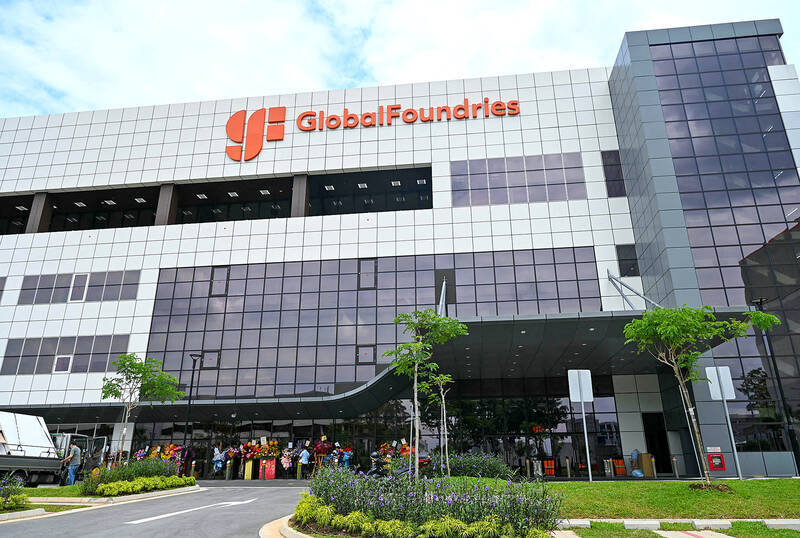The world’s third-largest contract chipmaker, GlobalFoundries Inc, yesterday opened a US$4 billion manufacturing plant in Singapore as part of a global expansion to help ease an industry supply crunch.
The facility would produce an additional 450,000 wafers annually at full capacity by 2025 to 2026, GlobalFoundries Singapore senior vice president and general manager Tan Yew Kong (陳耀光) told reporters, raising the city-state’s overall capacity to 1.5 million wafers per year.
The chips, usually used in smartphones and other mobile devices, are also increasingly in demand by automakers, especially for electric vehicles, adding to pressure to raise production.

Photo: AFP
“The key megatrends of our industry — digitalization, connectivity, cloud computing — are all driving acceleration to a more connected and data-centric world,” GlobalFoundries president and CEO Thomas Caulfield said at the launch.
“It demonstrates how central and critical the industry is to the world economy, and how pervasive semiconductors are in enabling and enhancing all aspects of human life,” he said.
Despite economic headwinds, the company expects the industry to double in the next decade, Caulfield said, adding: “The catalyst for this growth will be AI [artificial intelligence].”
The firm’s 23,000m2 Singapore facility, which broke ground in 2021, would boost the global footprint of the company, which already has plants in the US and Europe.
Singapore’s chip output makes up 11 percent of the global semiconductor market.
The global semiconductor market is predicted to experience a downturn of 10.3 percent this year, but recover next year and grow 11.8 percent, industry monitor World Semiconductor Trade Statistics has said.

MULTIFACETED: A task force has analyzed possible scenarios and created responses to assist domestic industries in dealing with US tariffs, the economics minister said The Executive Yuan is tomorrow to announce countermeasures to US President Donald Trump’s planned reciprocal tariffs, although the details of the plan would not be made public until Monday next week, Minister of Economic Affairs J.W. Kuo (郭智輝) said yesterday. The Cabinet established an economic and trade task force in November last year to deal with US trade and tariff related issues, Kuo told reporters outside the legislature in Taipei. The task force has been analyzing and evaluating all kinds of scenarios to identify suitable responses and determine how best to assist domestic industries in managing the effects of Trump’s tariffs, he

TIGHT-LIPPED: UMC said it had no merger plans at the moment, after Nikkei Asia reported that the firm and GlobalFoundries were considering restarting merger talks United Microelectronics Corp (UMC, 聯電), the world’s No. 4 contract chipmaker, yesterday launched a new US$5 billion 12-inch chip factory in Singapore as part of its latest effort to diversify its manufacturing footprint amid growing geopolitical risks. The new factory, adjacent to UMC’s existing Singapore fab in the Pasir Res Wafer Fab Park, is scheduled to enter volume production next year, utilizing mature 22-nanometer and 28-nanometer process technologies, UMC said in a statement. The company plans to invest US$5 billion during the first phase of the new fab, which would have an installed capacity of 30,000 12-inch wafers per month, it said. The

‘SWASTICAR’: Tesla CEO Elon Musk’s close association with Donald Trump has prompted opponents to brand him a ‘Nazi’ and resulted in a dramatic drop in sales Demonstrators descended on Tesla Inc dealerships across the US, and in Europe and Canada on Saturday to protest company chief Elon Musk, who has amassed extraordinary power as a top adviser to US President Donald Trump. Waving signs with messages such as “Musk is stealing our money” and “Reclaim our country,” the protests largely took place peacefully following fiery episodes of vandalism on Tesla vehicles, dealerships and other facilities in recent weeks that US officials have denounced as terrorism. Hundreds rallied on Saturday outside the Tesla dealership in Manhattan. Some blasted Musk, the world’s richest man, while others demanded the shuttering of his

Taiwan’s official purchasing managers’ index (PMI) last month rose 0.2 percentage points to 54.2, in a second consecutive month of expansion, thanks to front-loading demand intended to avoid potential US tariff hikes, the Chung-Hua Institution for Economic Research (CIER, 中華經濟研究院) said yesterday. While short-term demand appeared robust, uncertainties rose due to US President Donald Trump’s unpredictable trade policy, CIER president Lien Hsien-ming (連賢明) told a news conference in Taipei. Taiwan’s economy this year would be characterized by high-level fluctuations and the volatility would be wilder than most expect, Lien said Demand for electronics, particularly semiconductors, continues to benefit from US technology giants’ effort